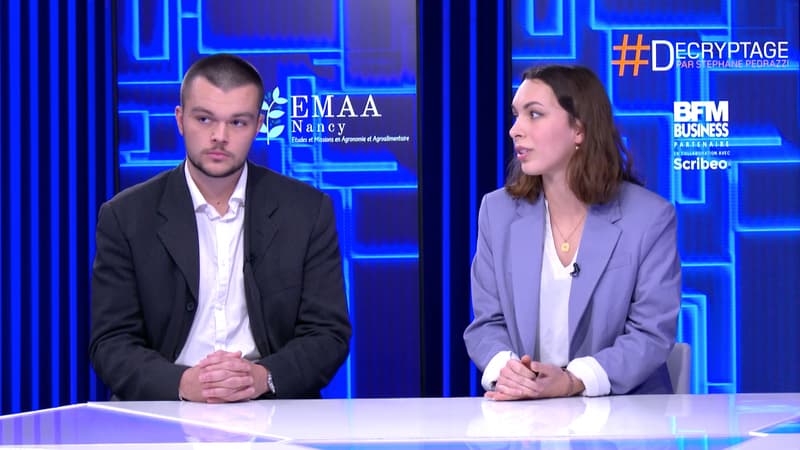Can you introduce us to EMAA Nancy?
Jean-Baptiste Marty: EMAA Nancy is a Junior Initiative. This student association (law 1901 association, non-profit, but with an economic vocation) acts as an intermediary between companies and ENSAIA students. We carry out services and missions entrusted by companies. ENSAIA students can thus put their knowledge into practice.
We also benefit from National Student Status–Entrepreneur, awarded by PeeL, Lorraine’s student entrepreneurship center. They participate in our development, through training, forums and round tables with companies, other young entrepreneurs and startups. With the agreement of ENSAIA, this status allows us to dedicate two hours of our programming to the Junior Initiative.
What motivated its creation?
JB. M: There has always been a Junior Initiative at ENSAIA! The first dates from 1982. Then it changed, notably with an integration in 2019 to the CNJE (National Confederation of Junior Companies), the first student movement in France. It is important to remember that ENSAIA is a school of innovation and transition, for eco-responsible agriculture and healthy and sustainable food. Moving on, EMAA Nancy follows these same goals.
How does ENSAIA support you?
JB. M: ENSAIA helps us develop in the world of entrepreneurship. This support involves, among other things, the courses given within the school premises and a monthly meeting with the director, Guido Rychen. ENSAIA supports us day by day in our projects. This is the case of our conference on women’s entrepreneurship, recently organized, and in which the director of ENSAIA participated.
Chloé Bolcato: The main vacancies at ENSAIA allow our students to become agronomists, engineers in the food industry and food production. It is in these sectors where EMAA Nancy can offer its services. At the same time, our training is applied to many other sectors of activity: biotechnology, environment, pharmacy… So many fields in which EMAA Nancy can also work.
Can you give us examples of commissions carried out by EMAA Nancy?
JB. M: As a multi-sector association, our studies and our missions are vast. They refer to the environmental impact, the CSR approach, awareness, the use of co-products, the development of green infrastructures, etc.
About this, a company contacted us. choose the different species of plants to install in a new building. There were several limitations: improving the space, demonstrating environmental awareness and, above all, working with windows that did not allow all UV rays to pass through. Therefore, we helped her select the species that were best adapted to this environment.
Students can also go out into the field to do soil studies or fertility studies. In this case, physicochemical criteria will be measured to highlight points, factors or variables decided by the company. Companies can also contact us via LinkedIn to entrust us with studies or tasks.
Why did you organize a conference on female entrepreneurship?
Lola Raflin: ENSAIA welcomes a majority of young women. Some courses are linked to the notion of entrepreneurship in our common core in the second year. But only in the third year is the issue really addressed and can be undertaken concretely. In fact, ENSAIA students have created a dozen startups. Therefore, EMAA Nancy wanted, through this conference, to show all the women in the school that they could start their own project; of course, this meeting was open to young men.
This conference was related to the association “Jamais sans Elles”, whose statutes we signed. EMAA Nancy is committed to promoting diversity in the world of entrepreneurship.
Several actors came to tell us about their field of activity, including the Willa association, which supports women from A to Z in their entrepreneurial projects. The manager of a Compagnie des fromages & RichesMonts factory, our partner, spoke to us about her journey. We also received a farmer who took charge of a goat farm, and a former ENSAIA student. In the origin of the Butternot project, she prepares to create her own business. So many stories that have inspired us.
What does the collaboration with the Compagnie des fromages & RichesMonts bring you?
LR: We got it thanks to ENSAIA! It will allow us to carry out missions in your company. We carried out a first mission to raise awareness in the collaborating factory. This partnership is proof of trust and enhances our work. A large company has agreed to publicly associate its image with ours because of our seriousness and rigor, and not just to carry out studies.
What do you expect for the future of EMAA Nancy?
JB. M: We want to get new partners and new studios! There is no Junior Enterprise like ours in Lorraine and in the Grand Est. Therefore, we look forward to continuing our influence in these territories, become a benchmark in agronomy and agri-food in our fields of study.
What values are you based on?
JB. M: Sharing, mastery, commitment and determination are our pillars. In this Junior Initiative we like the challenge. Every successful action is celebrated, and from every failure we learn to improve later.
This content was produced with SCRIBEO. The BFMBUSINESS editorial team was not involved in the production of this content.
Source: BFM TV


